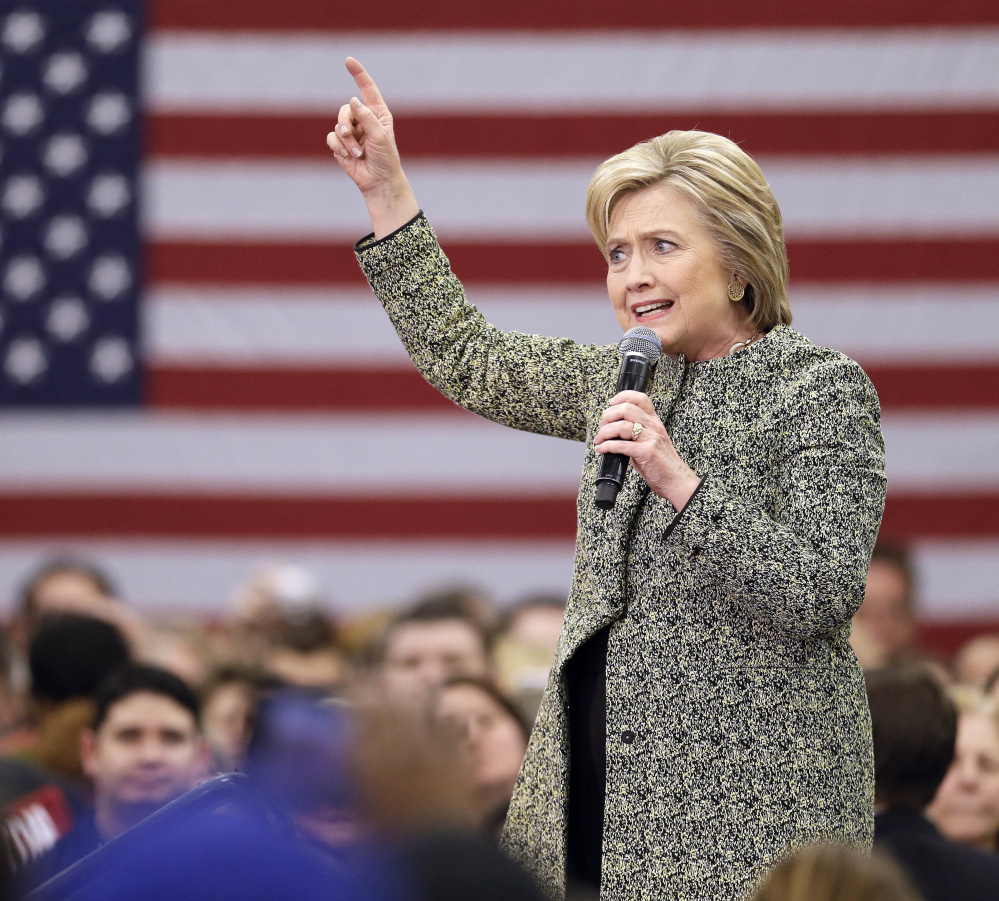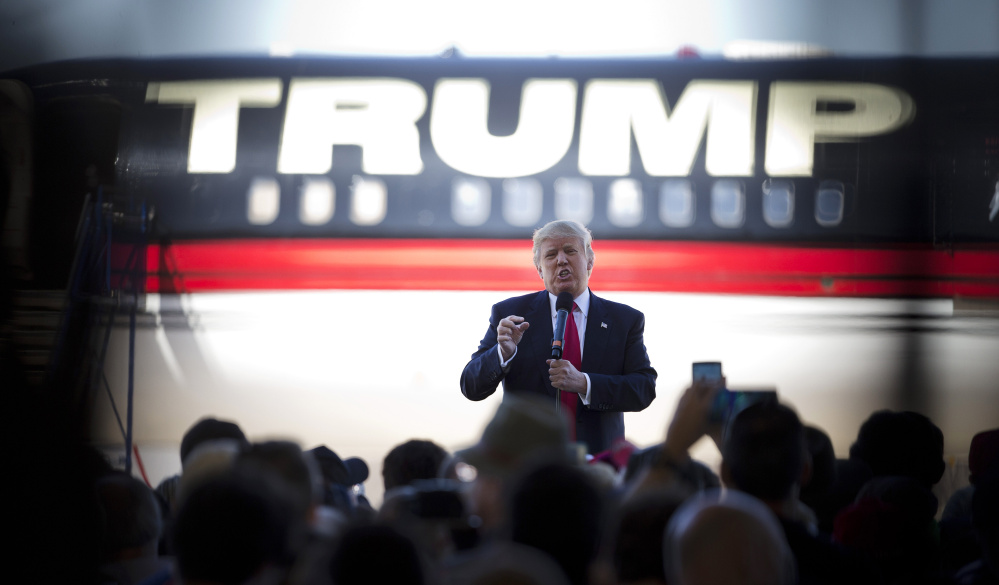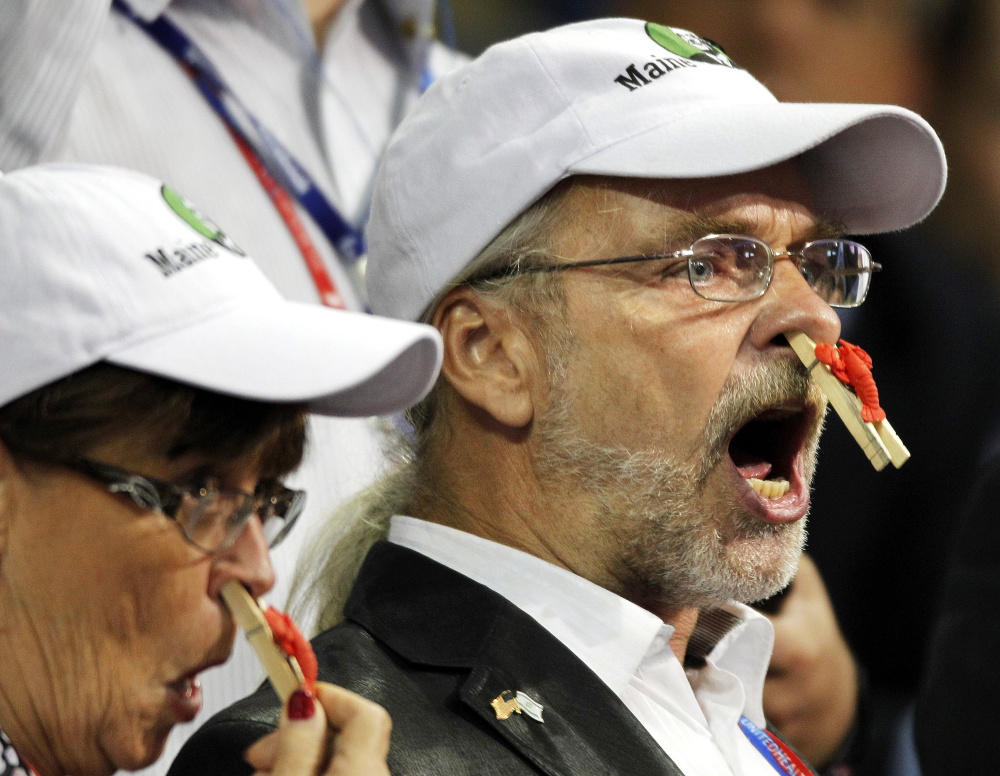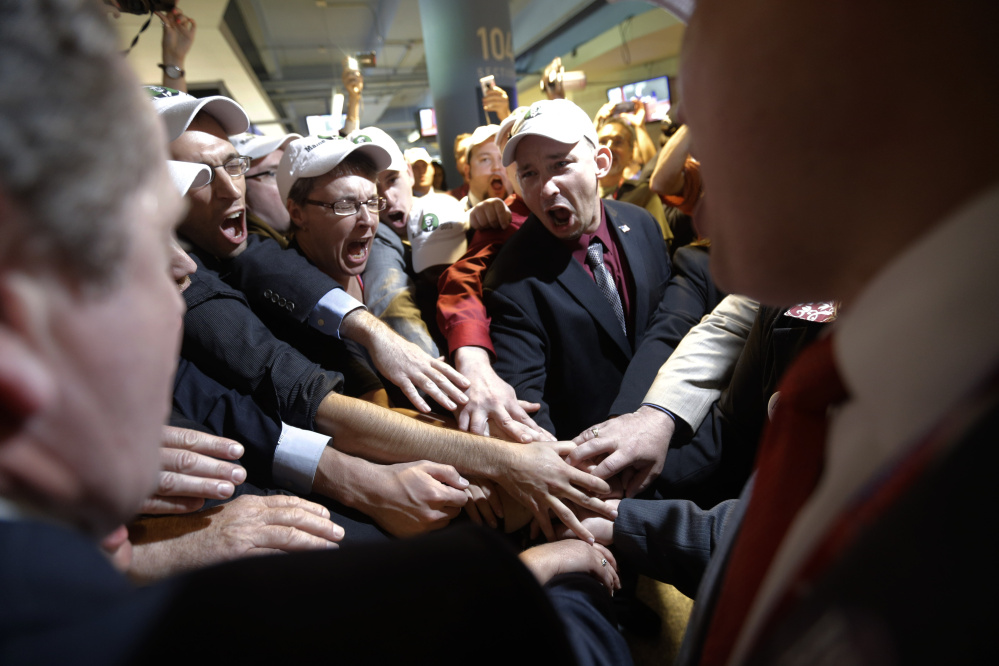AUGUSTA — Maine Republicans and Democrats will lend their collective voices to the unpredictable, frequently chaotic process of selecting their party’s presidential nominee during caucuses next weekend that are expected to draw large numbers of voters – and potentially national attention.
In many ways, the results of this week’s Super Tuesday votes in more than a dozen states will determine whether Maine’s presidential caucuses become a high-profile battle for delegates or an optional side trip for Donald Trump and Hillary Clinton in their glide toward party nominations. Maine is by no means a big prize, numerically speaking, with just 23 Republican delegates and 30 Democratic delegates up for grabs (compared with the 155 and 251 delegates at stake, respectively, in Tuesday’s Texas primaries).
But both state parties are reporting strong interest among voters in their respective caucuses, which are being held on different days – Saturday for Republicans and Sunday for Democrats – and are following dramatically different models.
One veteran political watcher said he was “going out on a limb and saying there was a good chance” that Maine’s caucuses could become an albeit-brief battleground in the campaigns.
“I don’t think anything that happens between now and then means that Maine won’t matter,” said Jim Melcher, a political science professor at the University of Maine-Farmington.
In 2008, both then-Sen. Barack Obama and Hillary Clinton made appearances in Maine the day before the Democratic caucuses during what would become one of the longest, hardest-fought contests for the party’s nomination. In 2012, both Mitt Romney and Ron Paul visited the state on the major caucus day, even visiting the same caucus location in Sanford. But the national headlines that followed were not the type of attention that party leaders wanted.
Paul supporters accused state party leaders of declaring Romney – the Republican establishment’s clear favorite – as the victor before all votes were even cast, much less counted. What followed wasmonths of vitriolic and highly public infightingbetween “mainstream” Maine Republicans and the party’s libertarian wing that ended on the floor of the Republican National Convention.
Not surprisingly, Republican leaders have made major changes to this year’s caucus process in order to avoid a repeat of 2012.
“Our goal is make sure this process plays out the way it is supposed to, that every voter’s voice is heard and counted and that we have a smooth process from beginning to end,” said Maine Republican Party Executive Director Jason Savage. “Any organization that has any sense of its own history looks for opportunities to improve upon what was done in the past.”
Both parties will offer voter registration at caucus sites, and independent voters not enrolled in either party can show up and join the party to participate in the caucus. However, an enrolled Democrat or Republican cannot show up at the other party’s caucus and change party affiliation on the spot.
Republicans
Republicans will gather Saturday at 22 regional locations around the state, with at least one caucus location in each of the 16 counties. That is a departure from 2012, when caucuses were held on different days and in more locations.
Voting will be open for three hours at each location, with participants casting their votes via secret ballot. Unlike in the Democratic caucus this year and past Republican caucuses, participants need not stay for the speeches by campaign advocates or for the local party business. Instead, participants can cast their votes at any point during the three-hour window – a change that Savage said is intended to help families, working voters or others who want to participate but cannot stay for the entire event.
In another major change from 2012, all 23 of the delegate seats won during Saturday’s caucuses will be “bound” – or obligated – to a certain candidate, with the number depending on the secret ballot tally. If one candidate receives more than 50 percent of the vote (technically, 50 percent plus one vote), he will receive all 23 Maine delegates. If no candidate wins majority support, each candidate who receives at least 10 percent of the statewide vote will receive a proportional allocation of the 23 delegates.
The decision to bind delegates is a direct response to the infighting that erupted in 2012 when delegates were not bound to a particular candidate. Still stinging from how the caucus played out, Paul supporters mobilized to take over the delegate-election process and all of the other parliamentary proceedings at the 2012 Maine Republican State Convention. By the end of the convention, 20 of Maine’s 24 delegates headed to the Republican National Convention were ardent Paul supporters.
But the fracas didn’t end there.
Romney supporters challenged the legality of the convention proceedings with the national party, which tipped the state in Romney’s favor by replacing 10 of the 20 pro-Paul delegates with 10 supporting Romney. The national party’s move was significant because, without Maine’s vote, Romney fell one state short of the threshold needed to guarantee him a prime-time speech to a national audience during the convention.
Yet Maine’s pro-Paul delegation still became one of the only spontaneous distractions in the otherwise scripted-for-TV convention as they protested their removal on the convention floor and then led a march with pro-Paul delegations from Texas, Iowa and other states.
It’s tough to predict who will win Maine’s 2016 caucuses.
There have been no public polls conducted of Maine voters in recent months. Former Florida Gov. Jeb Bush and businesswoman Carly Fiorina – both now out of the race – had led the fundraising contest in Maine through December, although money spent has proven a poor indicator of candidate success this year. U.S. Sens. Marco Rubio of Florida and Ted Cruz of Texas have vocal supporters within Republican ranks of the Maine Legislature, but Trump dominated in neighboring New Hampshire.
Savage didn’t want to play the guessing game.
“The race is going to change between now and then” because of the Super Tuesday states, Savage said. “But I think we are definitely going to have a contested race.”
That unpredictability is a key difference between a caucus and a primary, said one veteran political observer.
“Caucuses are generally so sparsely attended that a very committed group of supporters for any candidate can show up and impose its will in a way that can’t happen in a primary,” said University of Maine political scientist Mark Brewer.
Democrats
In 2016, the Maine Democratic Party is sticking with the traditional, town meeting-style caucus.
Registered Democrats will gather Sunday at more than 530 locations across the state, unlike the regional caucuses adopted by Republicans this year.
“We think it is really important, from a participation standpoint, that we have these caucuses at the municipal level,” said Jeremy Kennedy, executive director of the Maine Democratic Party. “To have a regional caucus, although it would be easier for us from an organizational standpoint, would really cut down on participation.”
Once the caucus begins and local party business is complete, surrogates for the Clinton and Bernie Sanders campaigns (or perhaps the candidates themselves) will make their pitches. Attendees will then separate into groups aligned with either candidate or none at all, if they remain uncommitted. Those groupings are then tallied, with the results being used to allocate delegates to the Maine State Democratic Convention on a proportional basis.
Each caucus location will then phone in its results to a central party hotline, with the title of “caucus winner” going to the candidate who accrues the most delegates statewide.
Maine Republicans are only accepting absentee ballots from active-duty military personnel, dependents of active-duty personnel or veterans “disabled in the line of duty and unable to get to the voting site.” Maine Democrats, on the other hand, had received roughly 16,000 absentee ballot requests as of Friday afternoon, according to Kennedy. Democratic officials are expecting such a large turnout Sunday that they have moved some of the traditional caucus locations to larger venues, however.
Maine will send 30 delegates to the Democratic National Convention – 25 delegates elected by attendees of the state party convention plus five “superdelegates” who can support whomever they choose.
Those superdelegates are already causing some angst among Sanders supporters in Maine and nationwide, however, because many have already pledged to support Clinton.
Three of Maine’s superdelegates – U.S. Rep. Chellie Pingree, state party vice chairwoman Peggie Schaffer of Vassalboro and Democratic National Committee member Maggie Allen of Madison – are supporting Clinton, while former state Sen. Troy Jackson of Allagash is helping lead Sanders’ campaign in Maine. The fifth superdelegate, Maine Democratic Party chairman Phil Bartlett, has said he would not endorse any candidate before the caucus.
Maine’s proximity to Sanders’ home state of Vermont could give the self-described “Democratic socialist” a leg up in the state. More than 7,500 people packed into Portland’s Cross Insurance Arena in July to see Sanders speak at a time when the campaign was just beginning to surge nationally. And last week, actress and part-year Maine resident Susan Sarandon made headlines by stumping for Sanders around the state.
But Clinton enjoys the support of many big-name Democrats in the state, including Pingree, Attorney General Janet Mills, former Gov. John Baldacci and Maine House Speaker Mark Eves. Clinton’s campaign announced Friday that two-time Olympic medalist Michelle Kwan will campaign Tuesday for Clinton in Bangor, Augusta and Portland.
“I think what is different this year is that neither campaign is taking Maine for granted,” Kennedy said. And if this election cycle has taught political watchers anything, he said, it’s that the dynamics of the race can change within a week’s time.
“I do think Super Tuesday will tell us a lot,” Kennedy said. “But we don’t have enough information from varied states yet to see where the race is going.”
Melcher, at UMaine-Farmington, predicted that Maine’s Republican caucuses will be under a microscope because of the events in 2012. But he said the enthusiasm of Sanders’ supporters, combined with the increasing negativity between Clinton and Sanders diehards, could make for interesting dynamics Sunday and at the Democratic state convention.
“I think it has the potential to be more tense and certainly closely contested,” he said.
Copy the Story LinkSend questions/comments to the editors.







Success. Please wait for the page to reload. If the page does not reload within 5 seconds, please refresh the page.
Enter your email and password to access comments.
Hi, to comment on stories you must . This profile is in addition to your subscription and website login.
Already have a commenting profile? .
Invalid username/password.
Please check your email to confirm and complete your registration.
Only subscribers are eligible to post comments. Please subscribe or login first for digital access. Here’s why.
Use the form below to reset your password. When you've submitted your account email, we will send an email with a reset code.